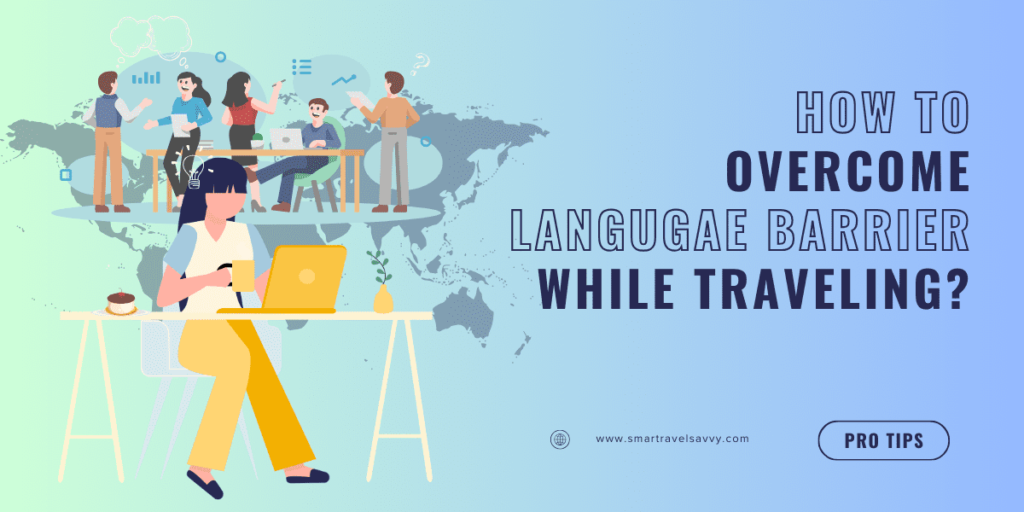
A beautiful moment can quickly turn stressful when you hit a language barrier when traveling. Not being able to communicate can make simple tasks like ordering food or asking for directions feel like a daunting challenge. Fortunately, there are several ways to overcome language barriers and make your trip smoother. Here’s how:
- 1. Use Translation Apps
- 2. Learn Basic Phrases
- 3. Use Visual Cues
- 4. Leverage Technology with Translation Devices
- 5. Use Body Language and Gestures
- 6. Rely on Locals and Hotel Staff
- 7. Download Offline Maps
- 8. Be Patient and Stay Positive
Table of Contents
Toggle1. Use Translation Apps
One of the most effective tools for overcoming language barriers is a translation app.
Apps like Google Translate, iTranslate, and Microsoft Translator are lifesavers when you need to quickly translate a sign, menu, or conversation.
They even offer offline modes, so you don’t need to rely on Wi-Fi or data.
2. Learn Basic Phrases
While you don’t need to become fluent, learning a few key phrases can make a big difference. Greetings, basic questions, and polite expressions like “please,” “thank you,” and “excuse me” will go a long way.
Many locals appreciate it when travelers make an effort to speak their language, even if it’s just a few words.
Common phrases to learn:
- Hello: “Hola” (Spanish), “Bonjour” (French), “Nǐ hǎo” (Mandarin)
- Thank you: “Gracias” (Spanish), “Merci” (French), “Arigatou” (Japanese)
- How much? “¿Cuánto cuesta?” (Spanish), “Combien?” (French), “いくらですか?” (Japanese)
3. Use Visual Cues
When words fail, visuals come to the rescue. Pointing at items on menus, using maps, or showing pictures of where you want to go can help communicate your needs.
Many travelers also carry small phrasebooks or guidebooks with pictures to point to.
4. Leverage Technology with Translation Devices
Translation earbuds like Google Pixel Buds or Timekettle M2 are transforming how travelers communicate. These smart devices allow real-time translation during conversations, making communication with locals seamless.
5. Use Body Language and Gestures
Non-verbal communication is universal, and body language can help fill in the gaps when words are lost.
Simple gestures like nodding, shaking your head, or pointing can effectively get your point across. Just be mindful of cultural differences; in some countries, certain gestures may have different meanings.
6. Rely on Locals and Hotel Staff
When in doubt, turn to locals for help. Many people working in the travel industry, such as hotel staff, are accustomed to dealing with tourists and can usually speak basic English.
Ask them to write down addresses or directions for you in the local language to show to taxi drivers or locals on the street.
7. Download Offline Maps
Google Maps or Maps.me offer offline versions of maps, so you don’t need to worry about language issues when navigating foreign cities.
Having access to maps without the need for data means you can find your way around with ease, even in areas where language is a barrier.
8. Be Patient and Stay Positive
Finally, keep a positive mindset. Overcoming language barriers can be challenging, but it’s all part of the travel adventure. Don’t be afraid to laugh at your mistakes or smile when things get confusing.
Most locals will appreciate your effort, even if the communication isn’t perfect.
Language barriers don’t have to ruin your travel experience. By using a mix of technology, body language, and a few well-learned phrases, you can navigate almost any situation abroad.
The world is full of friendly people ready to help, and with these tips, you’ll find that communication can be more of an adventure than a frustration.
For more insights on navigating language challenges, check out our articles:
- Lost in Translation: The Travel Nightmare You Didn’t See Coming”
- From Phrasebooks to AI Magic: The Hidden Story Behind Travel’s Tech Revolution.
Happy travels!
Frequently Asked Questions
You can learn by practicing with native speakers via online platforms like iTalki or HelloTalk, and immersing yourself in the language by watching movies, listening to podcasts, or reading books in that language.
To survive in a foreign country without knowing the language, use translation apps, learn basic phrases, rely on gestures, and save offline maps. Stay where staff speak your language, and be patient when communicating.
Traveling without speaking the language is easy with translation apps, learning basic phrases, relying on gestures, and using visual aids like maps. Staying in tourist-friendly areas and being patient also helps.
